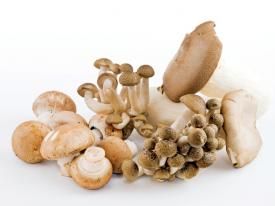French Firm Brings Unique, Synthetic, Antioxidant Ergothioneine Ingredient to Nutrition Market
Tetrahedron is now seeking broad U.S. commercialization of its unique nature-identical ingredient Ergoneine.

L-ergothioneine is still emerging as a dietary supplement ingredient, but at least a few companies believe it holds promise as an antioxidant supplement, with possible anti-inflammatory benefits to boot. One of those companies, Tetrahedron (Paris), is pushing for broad U.S. commercialization of its GRAS-affirmed ingredient Ergoneine and has now published a reproductive safety study on the ingredient in Food and Chemical Toxicology.1
Humans cannot synthesize L-ergothioneine, although they may absorb the amino acid from a few foods such as mushrooms, black and red beans, oat bran, garlic, and some meat products. (Microorganisms and fungi naturally produce ergothioneine, and other plants and animals absorb ergothioneine from the environment and diet.) Two companies offer synthetic, commercial ergothioneine ingredients: Tetrahedron and another company, Oxis International, which earlier sought to bring L-ergothioneine to the dietary supplements market under the brand name L-Ergo. Tetrahedron claims that Ergoneine is the purer and more cost-effective nature-identical ingredient (>99.5%).
It’s important to note that, although discovered more than a century ago, research on L-ergothioneine and its role, mechanism of action, and benefits in the body is still very much emerging. Interestingly, a 2014 PLoS One cohort study2 recently posited that serum levels decrease with age.
“Although the exact physiological role of [ergothioneine] remains to be elucidated, its properties and the existence of a specific transporter provide strong evidence of a role of [ergothioneine] as a physiological antioxidant, acting in concert with other antioxidant defenses,” according to Tetrahedron’s website. In addition, the company says, ergothioneine has a “slow turnover” and is “strongly retained in the tissues”-another promising and potential attribute in vivo. The company posits that L-ergothioneine “may play a critical role in many aspects of healthy aging by supporting the body’s defenses against oxidative stress.”
Earlier this year, Tetrahedron announced it had obtained self-affirmed GRAS status for Ergoneine, giving it the green light to market the ingredient-a more-cost effective alternative to natural ergothioneine-to the nutrition industry.
Tetrahedron describes its novel patented process for synthesizing L-ergothioneine as biomimetic (synthetic methods that mimic biochemical processes). “Contrary to other chemical processes for ergothioneine, our raw materials are the same natural and safe amino acids as those used in the biosynthesis by microorganisms and fungi,” the firm says-specifically, natural L-histidine as the starting material and natural L-cysteine as the sulfur source, the same sources mushrooms use to produce ergothioneine.
“We are very excited to bring this new source of L-ergothioneine to market,” said Jean-Claude Yadan, PhD, president, Tetrahedron, in a press statement in February. “Over 100 years of published research have suggested the untold potential health benefits of ergothioneine. Until now, that potential has gone unrealized due to the unavailability of L-ergothioneine at a cost and quality that makes it fully marketable. Our new Ergoneine ingredient, now Generally Recognized as Safe, will fulfill the unmet need for this very unique antioxidant L-ergothioneine in health nutrition.”
Also read:
Mushrooms Have Vitamin D, and Multiple Forms of It
Jennifer Grebow
Editor-in-Chief
Nutritional Outlook magazine
jennifer.grebow@ubm.com
References
- Forster R et al., “Reproductive safety evaluation of L-ergothioneine,” Food and Chemical Toxicology, vol. 80 (June 2015): 85-91
- Sotgia S et al. “Clinical and biochemical correlates of serum L-ergothioneine concentrations in community-dwelling middle-aged and older adults,” PLoS One, vol. 9, no. 1 (January 2, 2014): e84918
Photo © iStockphoto.com/espion
FDA revokes authorization to use Red No. 3 as a color additive in food or drugs
January 15th 2025FDA contends that the color additive is safe for humans but is legally obligated by the Delaney Clause of the FD&C act to revoke authorization as research shows the Red No. 3 induces cancer in rats.